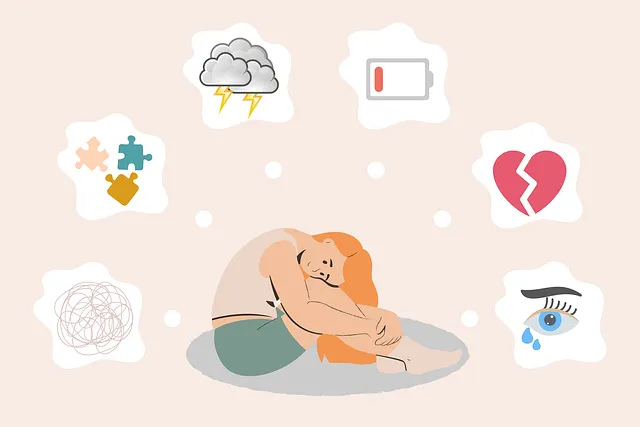Media portrayal profoundly shapes societal attitudes towards mental health, impacting public understanding and access to resources like the Kaiser Permanente Mental Health Access Center in Greenwood Village. Positive representations can reduce stigma and encourage help-seeking behaviors, while negative stereotypes hinder support. Kaiser Permanente's center leads a shift towards accurate, compassionate mental health media narratives through storytelling and partnerships. By sharing recovery stories and promoting cultural sensitivity, they foster understanding and empower individuals to seek support without judgment. Breaking down barriers through diverse, realistic portrayals in media is crucial for creating a supportive environment for mental health assistance.
Mental illness representation in media significantly impacts public perceptions, often perpetuating harmful stereotypes. This article explores strategies to challenge these misconceptions and promote positive mental health awareness. We delve into the effects of media portrayal on mental health, highlighting initiatives like Kaiser Permanente’s efforts to foster inclusive representations. By analyzing current media depictions, we identify gaps and offer solutions, focusing on real-world implementations at the Greenwood Village Access Center, showcasing effective approaches to enhancing mental health understanding.
- Understanding the Impact of Media Portrayal on Mental Health Perceptions
- Kaiser Permanente's Approach to Promoting Positive Mental Health Representations
- The Current State: Analyzing Media's Depictions of Mental Illness
- Strategies for Challenging Stereotypes and Promoting Awareness
- Real-World Solutions: Implementing Change at the Greenwood Village Access Center
Understanding the Impact of Media Portrayal on Mental Health Perceptions

Media portrayal plays a significant role in shaping societal perceptions about mental health. The way mental illnesses are depicted in films, television shows, and news media can influence public understanding and, consequently, access to resources like those offered by the Kaiser Permanente Mental Health Access Center in Greenwood Village. Positive representations can foster empathy, reduce stigma, and encourage individuals to seek help. Conversely, negative or stereotyped portrayals may perpetuate misconceptions, leading to a lack of support for those struggling with their emotional well-being.
Understanding these impacts is crucial for implementing effective Emotional Well-being Promotion Techniques and Burnout Prevention strategies. By encouraging accurate and compassionate media coverage, we can facilitate the Emotional Healing Processes for individuals dealing with mental health challenges, ultimately promoting better overall mental health in communities.
Kaiser Permanente's Approach to Promoting Positive Mental Health Representations

Kaiser Permanente, a renowned healthcare organization, has taken a proactive approach to promoting positive mental health representations in media and society at large. Their Mental Health Access Center in Greenwood Village serves as a beacon for educating the public and challenging prevalent stereotypes associated with mental illness. Through various initiatives, Kaiser Permanente aims to foster empathy and understanding among audiences by shedding light on real-life experiences of individuals navigating their mental health journeys.
The organization employs innovative Empathy Building Strategies that go beyond traditional healthcare services. They utilize storytelling, personal narratives, and collaborative partnerships with media outlets to present nuanced perspectives on mental illness. These efforts contribute to Mental Illness Stigma Reduction Efforts, ensuring that the public gains a more accurate and compassionate view of psychological struggles. By promoting resilience and hope through these campaigns, Kaiser Permanente encourages open conversations about mental health, ultimately empowering individuals to seek support without fear of judgment.
The Current State: Analyzing Media's Depictions of Mental Illness

The current state of media representation regarding mental illness is a complex and evolving narrative. Often, popular culture portrays individuals with mental health struggles as either dangerously unpredictable or tragically helpless, reinforcing harmful stereotypes that contribute to stigma. These one-dimensional portrayals can be particularly damaging, especially when compared to the nuanced experiences of real people navigating their mental health journeys.
Taking the example of Kaiser Permanente Mental Health Access Center in Greenwood Village, these centers exemplify the growing trend towards more accurate and compassionate media representation. By highlighting successful recovery stories and promoting public awareness campaigns that emphasize self-care routine development, such centers challenge outdated narratives. Moreover, they foster cultural sensitivity in mental healthcare practice by recognizing and addressing diverse perspectives, ensuring that everyone receives support tailored to their unique needs.
Strategies for Challenging Stereotypes and Promoting Awareness

The media plays a significant role in shaping public perception about mental illness. To challenge stereotypes and promote understanding, various strategies can be employed. One effective approach is to highlight stories of individuals who have successfully navigated their mental health journeys. By sharing these narratives, especially through platforms like Kaiser Permanente’s Mental Health Access Center in Greenwood Village, we can showcase the power of resilience building and inner strength development. This shifts the narrative from stigmatization to empowerment, encouraging others to seek support without fear of judgment.
Additionally, media organizations should strive for accurate representation by consulting with mental health experts and individuals living with these conditions. Promoting Mental Health Awareness through realistic portrayals in movies, television shows, and news coverage can help break down barriers and encourage open conversations. By presenting diverse experiences and avoiding simplistic stereotypes, the media can contribute to a more nuanced understanding of mental illness, fostering an environment where everyone feels comfortable seeking assistance when needed.
Real-World Solutions: Implementing Change at the Greenwood Village Access Center

The Kaiser Permanente mental health access center in Greenwood Village has emerged as a beacon of hope and change for the community. Through innovative initiatives, this center is not just providing accessible mental health services but also fostering an environment that challenges stereotypes and promotes understanding. One such initiative involves the implementation of a tailored Mental Health Education Programs Design aimed at empowering individuals to recognize and address mental health issues early. These programs, interwoven with Trauma Support Services, have been instrumental in normalizing conversations around mental well-being, especially among marginalized populations.
The center’s success lies in its holistic approach, where Mind Over Matter Principles are integrated into treatment plans, encouraging clients to cultivate resilience and hope. By combining evidence-based practices with compassionate care, the Greenwood Village Access Center is not just treating symptoms but nurturing the whole person. This comprehensive strategy ensures that individuals leave the center equipped with the tools needed to navigate life’s challenges, leading to improved mental health outcomes for the community.
Media representation plays a pivotal role in shaping public perceptions about mental illness. By analyzing current depictions and implementing strategies to challenge stereotypes, we can foster more accurate and compassionate understanding. Kaiser Permanente’s initiative at the Greenwood Village Access Center exemplifies how collaborative efforts can drive positive change, ensuring that individuals with mental health challenges are represented with dignity and respect, thereby reducing stigma and promoting access to much-needed support.






